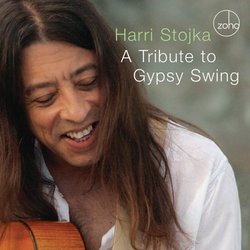A Tribute to Gypsy Guitarist Django Reinhardt
Grady Harp | Los Angeles, CA United States | 10/05/2006
(4 out of 5 stars)
"Harri Stojka is a gypsy guitarist. Now you probably have to be pretty to date on jazz to even know what that means or indicates OR you can listen to this infectious CD and discover for yourself.
Harri Stojka, born in Vienna as a Roma gypsy, carries on the tradition of the spectacular fingering and improvisations for which Django was internationally known in the 1930s. For the new listener this is music that is reminiscent of Kurt Weill, of strolling players across the continent of Europe and Asia, and of some down home American sounds. Stojka is an incredible technician with faster, cleaner fingers on the struts than most anyone else around. He is accompanied on this selection of thirteen tunes by Heimo Wiederhofer on brush snare, Claudius Jelinek on rhythm guitar and banjo, and Eva Berky on violin. The results are as fresh as anything around the jazz world today. Listening to this recording it is impossible not to yearn to dance! Grady Harp, October 06"
Not quite Django
Music maven | Amherst, MA | 01/08/2008
(3 out of 5 stars)
"There's no arguing with Harri's technique--he is, as others have commented, incredibly quick and clean, but while his approach here aims at Django, he makes the same mistake that many others have made, focusing on Django's technique rather than what really counts, which is his feel (it's the same mistake that Jaco Pastorius followers make). Django played with joy and a sense of discovery that is inevitably lost in a recreation. But most of all, he and his band had an absolutely unstoppable swing feel. Harri and his band here play the same kind of music, and in some cases the same songs, but their swing comes across as though it is written. The quick tempos feel frenetic, squared-off, and mechanical rather than jumping. Django's music was always relaxed, no matter how fast the tempo or the playing. With Django (and Stephane Grappelli), the music got all it's feeling from the irregular space between the notes, letting the listener supply the rhythm. Stojka and his band subdivide the spaces with precision, shutting out the listener from the process.
That's not to say the CD isn't enjoyable; it is. The tunes are great, the improvisation is nicely heard, and the recording is well done. It only seems weak in comparison to it's model. But then, no one has ever captured that Django feel quite as he did."


 Track Listings (13) - Disc #1
Track Listings (13) - Disc #1